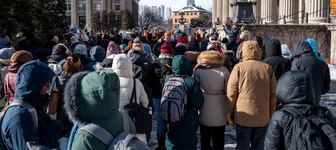Earlier this month, the government unveiled a website where people could request that at-home COVID tests be delivered to their homes for free. As Americans begin receiving their kits, data from the latest Economist/YouGov poll indicates that while many Americans know about the program, about half of that group still has not ordered the tests.
In a poll conducted January 22 - 25, four in five Americans (80%) had heard a lot (40%) or a little (40%) about the government website to request that COVID-19 at-home tests be delivered at no cost. Compared to older Americans, younger adults are less likely to have heard about the free-test program: 30% say they have heard nothing at all.
Among those who have heard about the program, about half (47%) successfully ordered tests, while the same share (47%) did not attempt to request a free at-home testing kit. Among those who heard about the program, older Americans, those living in urban areas, 2020 Biden voters, and Democrats were among the groups of Americans that were especially likely to succeed in ordering tests. More than half of fully vaccinated adults (54%) in this group said they succeeded at ordering the testing kits, compared to just 27% of people who do not plan to get vaccinated.
Beyond the at-home testing kits, other data indicates wide awareness of COVID-19 testing sites that Americans are able to frequent if needed. Two-thirds of Americans (67%) say that if they needed to get tested for COVID-19, they would know where to go. People living in urban areas (72%) are slightly more likely than those in suburban (66%) or rural areas (65%) to be aware of testing sites. Of those who know the locations of testing sites they could go to, 86% say those locations are open at a time when they are able to go.
— Ian Davis contributed to this article
See the toplines and crosstabs from this Economist/YouGov Poll
Methodology: The Economist survey was conducted by YouGov using a nationally representative sample of 1,500 U.S. adult citizens interviewed online between January 22 and January 25, 2022. This sample was weighted according to gender, age, race, and education based on the 2018 American Community Survey, conducted by the U.S. Census Bureau, as well as 2016 and 2020 Presidential votes (or non-votes). Respondents were selected from YouGov’s opt-in panel to be representative of all U.S. citizens. The margin of error is approximately 3% for the overall sample.
Image: Getty









